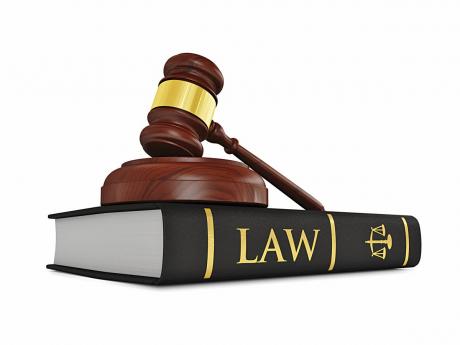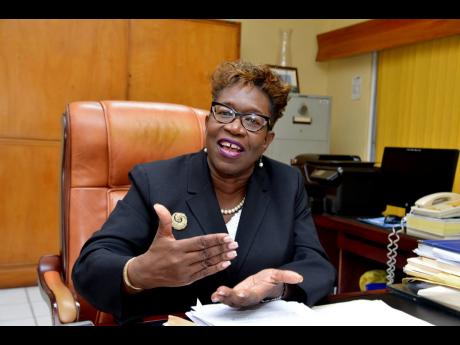High crime rate leads court to impose lengthy sentence for double murder convict
The crime crisis Jamaica is facing has rankled some judges so much that they threw the book at a double murder convict, imposing the maximum sentence.
In July, the Court of Appeal ordered that Rayon Williams must serve 45 years before being eligible for parole for his second murder conviction.
“There must be stiff penalties for murder convicts who use guns to kill and have no regard for the lives of others,” one judge told The Sunday Gleaner last week.
Another judge said that once there are no mitigating factors, lengthy sentences must be imposed.
But attorney-at-law John Clarke, who is representing Williams on appeal, said he is taking the issue to the United Kingdom Privy Council, Jamaica’s final appellate court, because he believes there were some very unusual happenings in both cases involving his client.
Clarke pointed out that the second case should have been sent back for trial by a jury based on fresh evidence adduced on appeal. He also disclosed that the judge who sentenced Williams at his second trial was appointed to the Court of Appeal Bench subsequently and that judge sat on Williams’ appeal against his first conviction, which should not have happened.
The attorney noted that the murders, which took place in September 2009 and December 2010, had the same eyewitness testifying in both cases.
In its ruling on the matter, the Court of Appeal said it considered that there was an element of premeditation and that an illegal firearm was used in the commission of the offence. The court found that the offence itself was an act of extreme violence and referred to the wantonness of the killing.
“We identified two aggravating factors: the prevalence of gun crimes generally and murders committed with the gun, in particular, and one previous conviction for murder. These factors would add 15 years to the notional sentence, resulting in a period of 50 years before parole eligibility,” the court noted.
“Similarly, we identified the appellant’s age (just shy of 28 years), his gainful employment at the time of arrest and one dependent as mitigating factors. To these we assigned the arithmetic value of five years, thereby reducing the period to be served before parole eligibility to 45 years.”
The sentence is reckoned as having commenced on June 26, 2014 and is to run concurrently with the other sentence being served.
Williams was first convicted by a jury in March 2013 for the murder of Hugh Cover in Spanish Town, St Catherine, in September 2009. After Cover was beaten by some men and hit in the head, Williams used a sword to cut Cover’s throat while he “was flattering on the ground like a fowl”, the witness testified.
The witness further said that Williams directed one of the men “to finish take off the head” and that was done.
He was sentenced to life imprisonment and ordered to serve 35 years before he can be eligible for parole. The Court of Appeal upheld the conviction and sentence, and ruled in May 2017 that the sentence should run from March 27, 2013.
FRESH EVIDENCE
In the second case, Williams was convicted by a jury in June 2014 for the murder of Geraldo Campbell, who was fatally shot in his shop on Oxford Road in Spanish Town, St Catherine, on December 18, 2010.
It was accepted at the trial that the eyewitness and the appellant knew each other and they had last spoken the day before the incident.
The witness said on the night of the incident, she saw Williams and a man called Maragh walking together. Williams walked to the shop and fired two shots before walking away with Maragh.
Williams gave an unsworn statement that the witness had accused him of stealing her gun. He called a relative who supported the unsworn statement that the witness was telling lies that he committed the offence.
The relative said she and the witness were together when they heard explosions and both of them went to the shop. The relative said the witness had asked her some time before to find out from Williams if he had taken her gun.
Williams had sought to produce fresh evidence for the hearing of his appeal on dates in October to December 2021, on the grounds that false evidence was given at his trial by the eyewitness.
In the recantation affidavit, the sole eyewitness who had testified at both trials averred that her evidence at the second trial was false and that it had been instigated by the police who had put her “under a lot of pressure”.
She stated that she wanted to “clear her mind and be at peace with God”, as she had given her life to Jesus Christ and sought His forgiveness.
The witness said in her affidavit of October 30, 2018 that she did not write the letter giving her account that was entered into evidence, but that she was forced to sign it. She stated, among other things, that she was writing on behalf of the appellant, whom she had sent to prison for two life sentences. She said a policeman told her to say the appellant did the shooting because he was an area leader and they wanted to get him off the streets. The police promised to set up a “big link” for her.
She admitted that she gave the false statement because she was afraid of the police, because they had killed her two sons and she feared they would harm her.
She outlined that she had to move to various addresses after the trial because threats were levelled against her by persons who kept insisting that she recant her testimony.
Director of Public Prosecutions Paula Llewellyn, KC, and prosecutors Tamara Merchant, Camelia Larmond and Cindi-Kay Graham challenged the purported retraction by the witness. The Crown presented its own fresh evidence contained in an affidavit filed by the witness on October 20, 2021 in which she said she was threatened.
The witness, in her oral evidence in the Court of Appeal, said she recanted her testimony because of threats but the evidence she gave at the trial was true. She said the appellant had her talk on the phone to a member of the St Catherine-based One Order Gang in a three-way conversation, and she was threatened with violence and death if she failed to carry out their instructions.
Llewellyn submitted that the contents of the repudiation documents support the contention that the witness was forced and threatened by agents of the appellant to make the retraction.
There were challenges to the handwritten letter. The handwriting expert for the Crown said the letter was not written or signed by the witness; therefore, it was a forgery. The handwriting expert for the appellant, however, said the signatures on the letter were authentically those of the witness.
The Court of Appeal said the witness, in her oral testimony, contradicted herself when asked by the court if she had signed the letter and she said she “did not write, sign or had anything to do with it”.
A justice of the peace testified that the witness signed the letter in his presence. The court said it believed she did so, “there being no good reason for her not to have affixed her signature to it, in his presence”.
NO CREDIBLE TESTIMONY
Commenting on the handwriting issue, the court said, “It is noteworthy that both experts concluded that there was tracing or overwriting as it pertained to the handwritten letter. They both agreed that overwriting goes to intent. In the opinion of the Crown’s expert, it was the intent of the forger, while in the opinion of the expert for the appellant, it was the intent of the witness. Rather, the conflicts in the findings of the two experts are so profound, that we prefer to consider their testimonies in the context of all the other evidence.”
Clarke submitted that there was no satisfactory explanation by the witness for her delay in reporting the alleged threats until some six years later.
He said the Crown’s fresh evidence was contrived and further affected the credibility of the witness and the reliability of her evidence.
The court ruled that having heard the testimony of the eyewitness and that of several other witnesses, “we are of the opinion that the purported presentation is incapable of belief. The witness’ testimony supported the evidence contained in the repudiation documents that she was compelled to recant because of intimidation and threat of personal violence against her. The integrity of the fresh evidence was also compromised by the inconsistencies in the evidence to support it”.
The court’s decision was that there being no credible testimony to rebut the witness’ assertion “that the evidence she gave against the appellant at the trial was the truth, we believe that the appellant’s fresh evidence is incapable of belief and that its admission is not necessary or expedient in the interest of justice”.
The court said further that the additional fresh evidence was not supportive of a conclusion that the retraction was voluntary, genuine and capable of belief.



